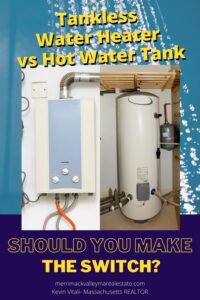
As a homeowner, you will be faced with replacing your hot water tank at some point.
Traditionally, most homes have a hot water tank. A hot water tank can last 8 to 15 years, depending on how they are fueled and your water quality.
When it comes time to replace a hot water tank, you may be considering switching to a tankless water heater.
Tankless hot water heaters or, what are commonly called, on-demand water heaters, can be a great upgrade to your home.
While there are many pros to a tankless water heater, they do come with their downsides.
When it comes time to sell your home, tankless water heaters are a welcome addition that homebuyers will take note of.
Tankless Water Heater vs. Hot Water Tank
Traditional hot water tanks are heated from the bottom by an element and keep a constant hot water supply in a storage tank to draw on at any time. Typical residential hot water tanks for an average home will range from 30 to 60 gallons. It will constantly keep a hot supply of water in the tank. This also means the tank is expending energy even when no hot water is needed.
The big downside of a hot water tank is as the hot water is heated from the bottom, so are the sediments and minerals in your water that accumulate the floor of your heater. The sediments and minerals cause the tank and heating element to rust and fail. And in some cases, the failure can cause a big mess when the bottom of the tank corrodes.
When a traditional hot water heater fails, the water continues to flow out into its housed area until the water is shut off.
A tankless water heater only heats the water you need on demand. Energy to meet your hot water demands is only expended when the water is heated for immediate use.
A Closer Look At How A Tankless Hot Water Heater Works
Either electricity or gas can fuel a tankless water heater. The process starts when you turn on the hot water somewhere in your house. Once the tankless hot water heater senses the flow of water, it immediately starts to heat the water as it moves through the heat exchanger fed by cold water.
As the cold water flows through the heat exchanger, the water is brought up to the appropriate temperature and then hot water is fed to the fixture that requires hot water.
A tankless water heater only heats the water you require as needed and supplies a continuous flow of hot water.
SHOULD I SWITCH TO A TANKLESS WATER HEATER?
The Pros of A Tankless Water Heater
There are many great reasons to consider switching from a traditional hot water tank to an on-demand, tankless hot water heater. Here are a few reasons why you may want to switch to a tankless hot water heater.
Energy Efficiency
The number one reason many homeowners consider a tankless hot water heater is to save on energy. Because you only use enough energy to heat the water you require, you save considerably on energy.
According to the Department of Energy, up to 20% of your utility costs are to heat water for your home.
A tankless hot water heater can save you 24-34% of your energy costs to provide your home with hot water. With the average home spending $400 to $600 a year by switching to a tankless hot water heater, you could save $100 a year or more in energy costs to heat your water.
Space Savings
Tankless units are incredibly small compared to their counterparts. They are a great option to save on space. Essentially, you are giving up a 30 to 50 gallon storage tank that sits on the floor of your basement or utility room.
A Rheem mid-efficiency tankless water heater would be mounted on the wall and would have a depth of under 10″ a height of 26″ and a width of 14″. Where as a 50 Gallon hot would stand on the floor and have a diameter of 24 inches and stand just over 50″ tall.
Never-Ending Supply Of Hot Water
Because tankless hot water heaters heat the water as needed, there is a never-ending flow of hot water. A hot water tank can run out of hot water during heavy use periods.
But with a tankless unit, four showers back to back should be no problem!!
Longer Life
A tankless water heater should last 20-30 years as compared to a hot water tank which will have a useful life of about 8-15 years. Hot water tanks tend to rust out quickly because mineral sediments cause the tanks to rust prematurely as they are heated.
And on demand systems only heats the water as it is needed and does not have sediment “cooking” on the bottom 24/7.
Better For The Environment
Overall, they are better for the environment for several reasons. The obvious reason is it uses less energy compared to a traditional hot water tank.
But it goes beyond energy savings when we are talking about being tankless water heaters being better for the environment.
By their sheer size, there is far less material waste in landfills when tankless water heaters fail. Plus, an average hot water tank is about 150lbs, with a tankless hot water heater runs about half of its counterpart. Fewer materials are being expended at the end of the life cycle.
But not only are tankless heaters smaller and use less materials, they last 2 to 3 times longer than a traditional hot water tank.
If you are trying to leave less of a footprint on this earth, then a tankless hot water heater is the way to go.

The Cons of A Tankless Water Heater
With all the benefits a tankless water heater can provide, they aren’t entirely without their downsides. But in general, their downsides are minor or can be worked around.
Cost Of Tankless Hot Water Heater With Installation
Probably the biggest downside of switching from a tankless water heater is the cost. The switch is going to require a rework of both the electrical and plumbing, driving up installation cost as well as the equipment costing more money as well.
A typical tankless hot water heater can run between $1200 and $2200. Installation of a tankless hot water heater will run about $800 to $2500. The plumbing and electric and plumbing will have to be entirely reworked for the installation of a new tanless hot water heat.
A hot water tank can be purchased between $500 and $1200 with installation running from $600 to $1200.
You can check out tankless hot water heaters at the Home Depot website.
Takes Longer To Deliver Hot Water
There may be a slight lag time between turning on the faucet and getting hot water. A hot water tank stores water at the appropriate temperature and is always ready to go.
A tankless hot water heater must bring cold water up to the appropriate temperature, creating a slight delay in delivering hot water.
Multiple Hot Water Outlets Running Can Overload The System
If you are trying to do laundry, dishes and have multiple showers running at the same time, your tankless hot water heater may have a hard time providing enough hot water. Make sure your heater is properly sized when it is installed.
There are solutions like adding a second water heater for the house or smaller units for isolated areas like the kitchen, while the solution is simple, by adding more units, it is costly.
Difficulty Maintaining Luke Warm Water Temps
Because tankless hot water heaters needs a certain flow of water to activate the heat exchanger, maintaining luke warm temperatures may be a challenge.
Cold Water Sandwich
When taking back to back showers, the second user may start with warm water but then get a blast of cold water as the tanless system starts up again.
The blast is caused by hot water already in the pipes, but as the flow starts, cold water is brought through the system and hits the shower before the system catches up. It is a minor issue, but one to be aware of and it does take getting used to.
Requires Regular Flushing
Both tankless hot water heaters and hot water tanks can benefit from regularly flushing the system. But, owners of hot water tanks often neglect the simple task that can keep the system in service for a longer period of time. The lack of maintenance shortens the life and many homeowners never flush the tank over the life cycle of a hot water tank.
A tankless hot water system is more sensitive, and relies on multiple sensors in the heat exchanger that can get a build up of minerals and deposits that cause the system to act erratically. A regular yearly or bi-yearly flushing of the system should prevent this from happening is a definite must.
Tankless Hot Water Heater Fired By Gas or Electric?
For many, the choice may be simply because you may not be able to easily get gas to a gas to your tankless hot water heater, leaving electric as your only choice.
There are many advantages to an electric system. The cost of the equipment and installation will be lower with an electric tankless hot water system. While more efficient than a gas system, an electric heater may cost the same or more fuel, depending on gas prices.
Undoubtedly, a gas or electric tankless hot water system is still a great upgrade.
Frequently Asked Questions About Tankless Water Heaters
What is a tanlkess hot water heater?
What are the advantages of using a tankless hot water heater?
Are tankless hot water heaters suitable for all homes?
How much does a tankless hot water heater cost, and is it cost-effective in the long run?
Do tankless hot water heaters require maintenance?
Can I replace my existing tank-based water heater with a tankless hot water heater?
Summary
Overall, switching to a tankless water heater can be a beneficial upgrade for most homes. You will be using less energy as well as leaving less of a footprint on this earth.
Before making a final decision, discuss with your plumber your needs and the best route to go.
Other Real Estate Resources:
- Real estate contracts are filled with important timelines that must be met. Pual Sian discusses some significant dates you may find in a real estate contract. Missing an essential deadline can cost you money!
- Buying your first house can be exciting. Luke Skar has made that process a little easier by providing a list of must-have items when you purchase your first home.
- You often hear of agents talk about neutral colors and neutral decor. But have you ever wondered why that is so significant? Find out why “neutral” can play a big part of the home selling process.
- Are cash offers on a house king? Bill Gassett discusses how cash offers can be different from a financed offer. On the upside, cash offer eliminate a lot of risk for a seller, but often come with a lower offer price.
Should I Switch To A Tankless Water Heater? is provided by Kevin Vitali of EXIT Realty. If you would like to sell or buy a home, give me a call at 978-360-0422 and let’s get the process started.
Real Estate Services in the following areas: Northeast Massachusetts, Merrimack Valley, North Shore and Metrowest. Including the following communities and the surrounding areas- Amesbury, Andover, Billerica, Burlington, Chelmsford, Dracut, Groveland, Haverhill, Lowell, Melrose, Merrimac, Methuen, Middleton, North Andover, North Reading, Reading, Stoneham, Tewksbury, Tyngsborough, Wakefield, Wilmington, Westford,




